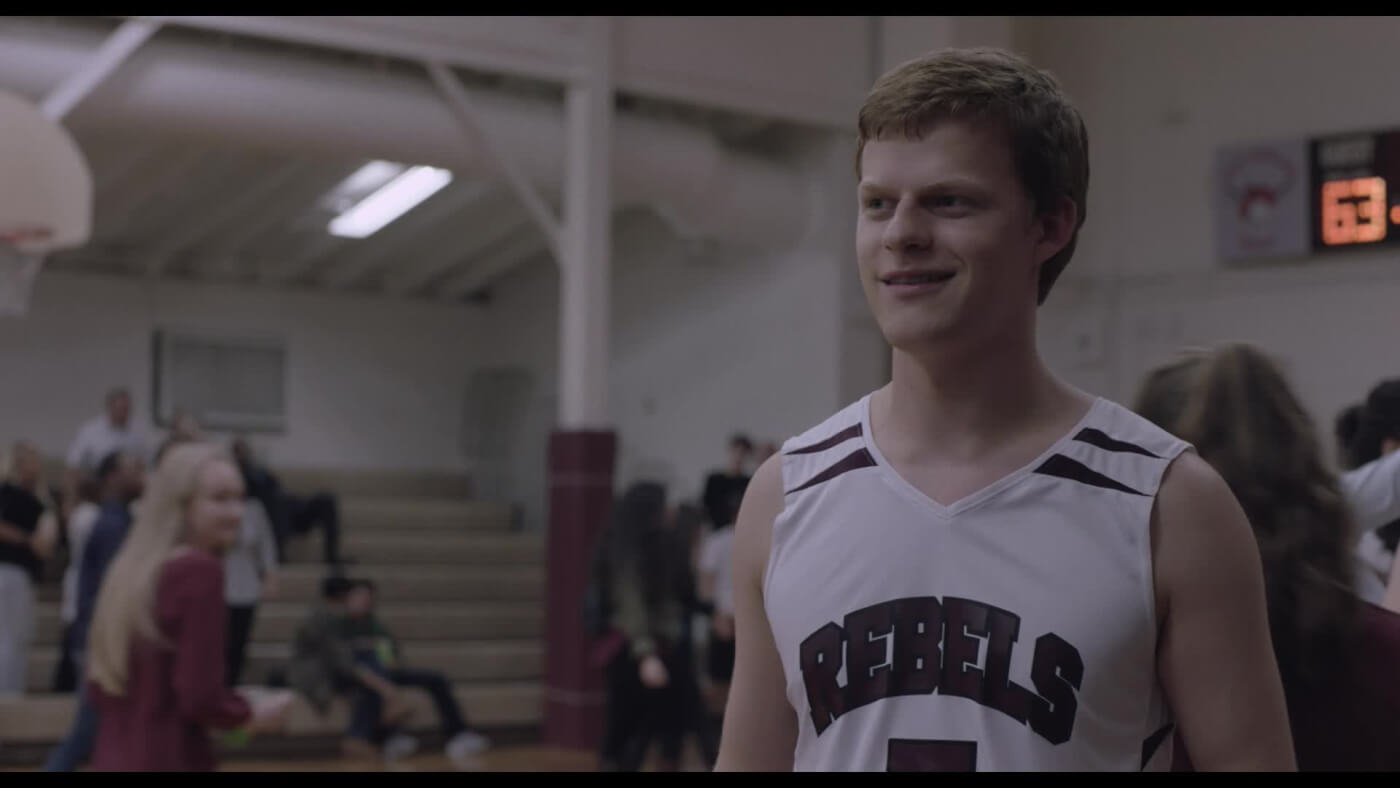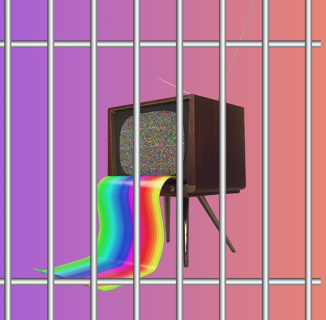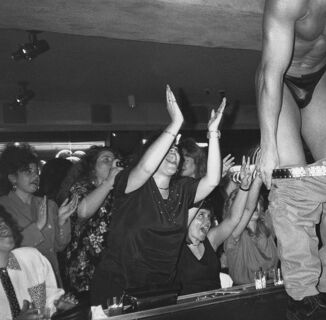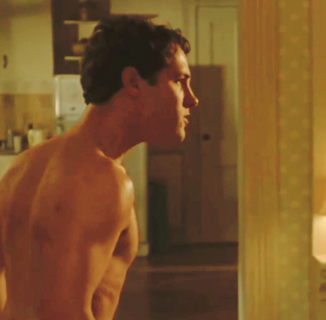There is a scene in Boy Erased in which Jared (Lucas Hedges), after being subjected to days of conversion therapy, stands in front of an advertisement of a half-naked man and begins to touch him. It’s a moment of intense longing condensed into a split second, with the tone flipping directly to anger as he throws a rock at the ad and then screams “Fuck you!” numerous times.

This scene is a perfect summation of all of Boy Erased: aimless aggression in place of a sincere struggle with queerness. It’s a drama that takes deep pleasure in watching its protagonist suffer, never really taking a single moment to explore his mental state unless it’s being yelled at the audience or another character on screen. Revelations come in shouting matches or dramatic discussions and the queer gaze is entirely missing from the film, with the closest thing to any kind of queer gaze being the aforementioned sequence.
Though one could make the argument that actor/writer/director Joel Edgerton shouldn’t have made this film in the first place — something he’s questioned himself — his heterosexuality is not the problem here, especially considering he is adapting openly gay Garrard Conley’s memoir. There are a number of films by heterosexual men that have nailed what the queer gaze consists of, and while it is a fool’s endeavor to attempt to define the queer gaze with any specificity, it’s easy to understand when it’s depicted properly.
Take, for instance, the recent Academy Award-winning film Moonlight, another film by a heterosexual filmmaker (Barry Jenkins) based on text by a queer man (Tarell Alvin McCraney). In Moonlight, the third act is where the queer gaze primarily unfolds. Jenkins’ well-known love of Claire Denis is unsurprising in the way his camera longingly travels over the bodies of men, a genuine mixture of attraction and hesitance lingering in the air. Then there’s the way he draws from Wong Kar-Wai, arguably pulling most from In the Mood for Love, though his entire career is queerer than most gay films made in the 2010s. These are two films that revel in aesthetics; in the smoke in the air, in the way two men stare at each other’s faces, in the way they maintain a certain distance from each other for fear of disrupting the moment. That’s the queer gaze.
But it isn’t only palpable in the third act of Moonlight, it’s in every waking moment we spend with the character of Chiron. We are made painfully aware of why he has grown into the man he is: an imitation of the man who raised him that can barely handle the notion of intimacy with another man because of his past. In Moonlight, we see both trauma and the repercussions of it. In Boy Erased, it’s all trauma.
Everything in Boy Erased is designed to emphasize how much of a shitty situation Jared is in. He isn’t allowed to look at any of the boys in his group, nor can he touch them for any purpose other than a handshake of respectable length, but Edgerton never explores the concept of being forbidden to see and touch in a visual manner. Everything is presented as neutrally as possible, the camera feeling cold and uninterested in any kind of attraction.
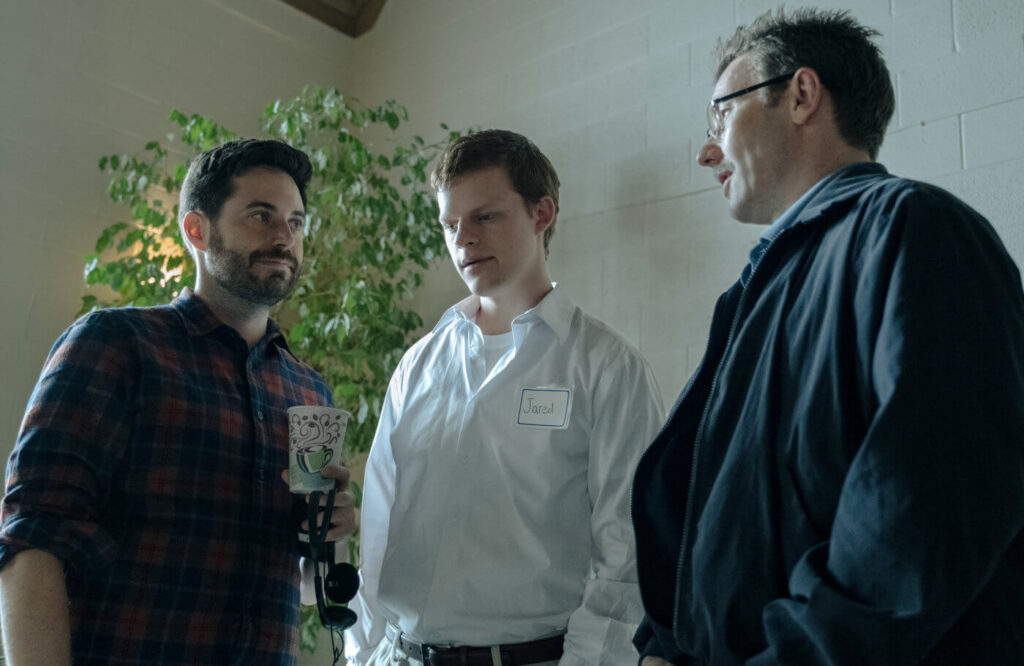
In fact, Jared’s first experience with homosexuality is one based in sexual assault. As revealed through flashbacks, he was raped by a college classmate. Edgerton presents this in the most matter-of-fact way possible, the camera holding on the assault for an excruciatingly long period of time. This could be a smart way to kick off an arc of self-reflection, but there’s no build-up to it and no aftermath either. It mostly exists as a plot point for Jared to be forced out of the closet by this man, rarely being referenced or explored past surface-level comments that advance the plot.
A good film, like a good memoir, hones in on exploring a traumatic incident and the impact it has on not only the coming-out process, but also the way that this character handles queerness and intimacy. Where the lack of kissing in Moonlight is grounded by Chiron’s trauma and how it deeply affects him, the lack of any intimacy outside of the most awkward cuddling of all time in Boy Erased feels like a deliberate oversight.
Viewers don’t see Jared struggle with his sexual assault. Instead, his intimacy issues are reduced to a fear of his own queerness grounded entirely in religion and conditioned self-loathing. Hedges’ eyes may say plenty, but the Oscar-bait monologues he’s been handed focus on how he hasn’t felt damaged by those around him. Unlike Conley’s memoir, which distinctly goes into the way his sexual assault was intrinsically linked to his association of sin to queerness (as anyone who has been misread the Bible by a deeply homophobic religion for years would), Edgerton’s film sidesteps that. It is the kind of material that is too salacious to discuss, even though we saw it play out on screen just moments ago.
One could make the argument that Boy Erased is made for the parents of queer folks like Garrard Conley, caught somewhere between knowing that these programs are damaging and believing that their faith can change their child. This is more than plausible, considering how much time Edgerton dedicates to depicting Conley’s mother (Nicole Kidman) as a savior with big hair and how much of the last act is spent showing Jared trying to get his father (Russell Crowe) to read an article about his experiences. But if we expect Jared’s father to be faced with the realities of what happened to his son, should we not be expecting audiences to be faced with this as well? Should we not be asking audiences, in an R-rated movie, to have to deal with the repercussions of what is happening on screen? Joel Edgerton has no interest in doing so.

Even the postscript in the film’s end credits feels as reductive as possible regarding its characters’ queerness. Most notably, they note that Edgerton’s counselor Victor Sykes, who is nothing more than a villain throughout, left Love In Action (now known as Restoration Path) and turned out to be gay and lives with his husband. To close on this after painting the character as one-dimensional the entire film is embarrassing at best and offensive at worst. It’s not just painting with the broadest of brushes, it’s acting like people can only be villainous because they’re closeted homosexuals. Worse than that, it’s allowing a heterosexual audience to get off scot-free, walking away knowing that it was just another damaged faggot with internalized homophobia and not a straight person doing the harm.
This is where it’s impossible not to bring up another film about conversion therapy that dropped this year: Desiree Akhavan’s The Miseducation of Cameron Post. Both Boy Erased and Cameron Post are tied to the conversion therapy program Love In Action, the former based on Conley’s time in the program and the latter inspired by a 2005 controversy in which a young man named Zach Clark sparked an investigation into LIA because of a MySpace post that alleged abuse and mistreatment.
It’s interesting to see the specificity of things in Cameron Post by comparison to the broad misery of Boy Erased. Edgerton revels in pain, more physical than anything emotional or spiritual, slamming down Bibles in slow motion with Saunder Jurriaans and Danny Bensi’s sappy, stringy score turned up loud for eye-roll-worthy emphasis. Akhavan, by comparison, is quiet and cool in her approach, interested in the way characters externalize their pain without shouting, only really breaking that pattern once with a loud, almost excruciating to watch scene for one supporting character that deviates from the standard.
The counselors of Boy Erased’s Love In Action don’t have nuance. They’re the kind of men who read Bible verses and stare at you in the bathroom, only waiting for a chance to call you a faggot. Do they genuinely buy into the concept of ridding yourself of the sin of same-sex attraction? Who knows. The counselors of Cameron Post are layered. Where Edgerton’s Sykes is outed in the credits, John Gallagher Jr.’s entire characterization of Reverend Rick is based around him being a man who has been “saved” from queerness. There’s a deep loneliness in his every action, a desperation to “fit in,” whether it’s in how he tells his story (being found at a gay bar by his peers and rescued from temptation) or in how he attempts to make small talk with the youths he believes are just like him.

At no point does Akhavan excuse his actions (or, rather, his inaction in actually helping any of these kids, including one who attempts suicide), but there’s a deep empathy for this individual who has been sold a lie. The film understands that he is as much a victim as he is the perpetrator of these crimes, just as damaged as the kids being taught to hate themselves and their actions, existing with a sense of shame that no human being deserves. It’s a testament to how The Miseducation of Cameron Post respects its audience as much as its characters, and the lack of a concrete ending is part of it. Characters ride off away from their current oppressors, hoping for a better life now that they’ve found their queer family. Their support system is other queer people who are dealing with something similar, not a straight person riding in to save the day. Things could go wrong, things could go well, but that’s life.
The characters and the plot of Boy Erased are neat, handed an ending that is all wrapped up with a bow for audiences to be glad that our protagonist escaped and is married and has no issues that have stemmed from his trauma. It’s unbelievable. Some might argue gay audience members deserve a happy ending, deserve a fantasy, but when the truth is stretched and trauma is ignored, is anyone benefiting? This isn’t Love, Simon. This is life.
Films like Boy Erased will always exist. Queer pain is marketable, especially when diluted into its laziest incarnation as misery porn for straight audiences to pity queer people. And this, more than anything else, is why we need more films like The Miseducation of Cameron Post, why we need more films like Moonlight. Films that understand that there are nuances to queer living, that understand that while there aren’t always easy answers or solutions to the problems that come with being alive and queer, there is, in fact, beauty and the possibility of a future in a world that is miserable.
Help make sure LGBTQ+ stories are being told...
We can't rely on mainstream media to tell our stories. That's why we don't lock our articles behind a paywall. Will you support our mission with a contribution today?
Cancel anytime · Proudly LGBTQ+ owned and operated
Read More in Culture
The Latest on INTO
Subscribe to get a twice-weekly dose of queer news, updates, and insights from the INTO team.
in Your Inbox

